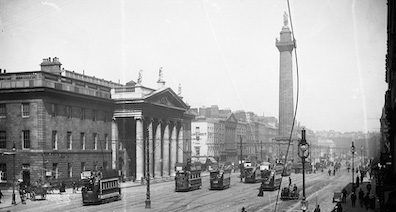The "timekeeper" who shouts out the destinations of various
trams at the beginning of Aeolus was a dispatcher
stationed at Nelson's Pillar where all the lines originated.
In 1904 the position was held by Richard Delany, known around
Dublin as "the Captain."
In Through Streets Broad and Narrow: A History of Dublin
Trams (2008), Michael Corcoran observes that the
timekeeper "ordered departures by calling out destinations
rather than motorman's names or car fleet numbers" (68).
Corcoran identifies Richard Delany as the man who held the job
in 1904, observing that "He was renowned for his prodigious
memory and is reputed to have never needed to consult a
timetable" (68).
In The Bloomsday Trams: Dublin's Tramway Fleet of James
Joyce's Ulysses (2009), David Foley adds several
features to the portrait. Delany was 62 in 1904. He was
married to a woman 22 years younger and they had three young
children, two boys and a girl. The motormen called him "the
Captain" because he had served three years in the metropolitan
police after moving to Dublin from Queen's County (now County
Laois), and "He never used a whistle" (8). None of Delany's
biography figures in Ulysses except this last detail:
Joyce opens a chapter dedicated to wind, sound, speech, and
language with the piercing voice of the timekeeper calling out
name after name.
Vivien Igoe (2016) observes that, in an 1888 article in Sport,
Jakes
M'Carthy wrote, "You just peep over and see if Delany,
the commander-in-chief of the tram cars is gone, for he
appears to me to never leave the place, and is there shouting,
'Go on, Rathmines!' night, noon and morning the whole year
round."
